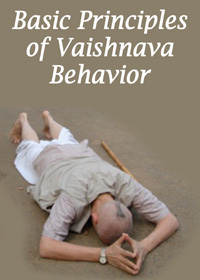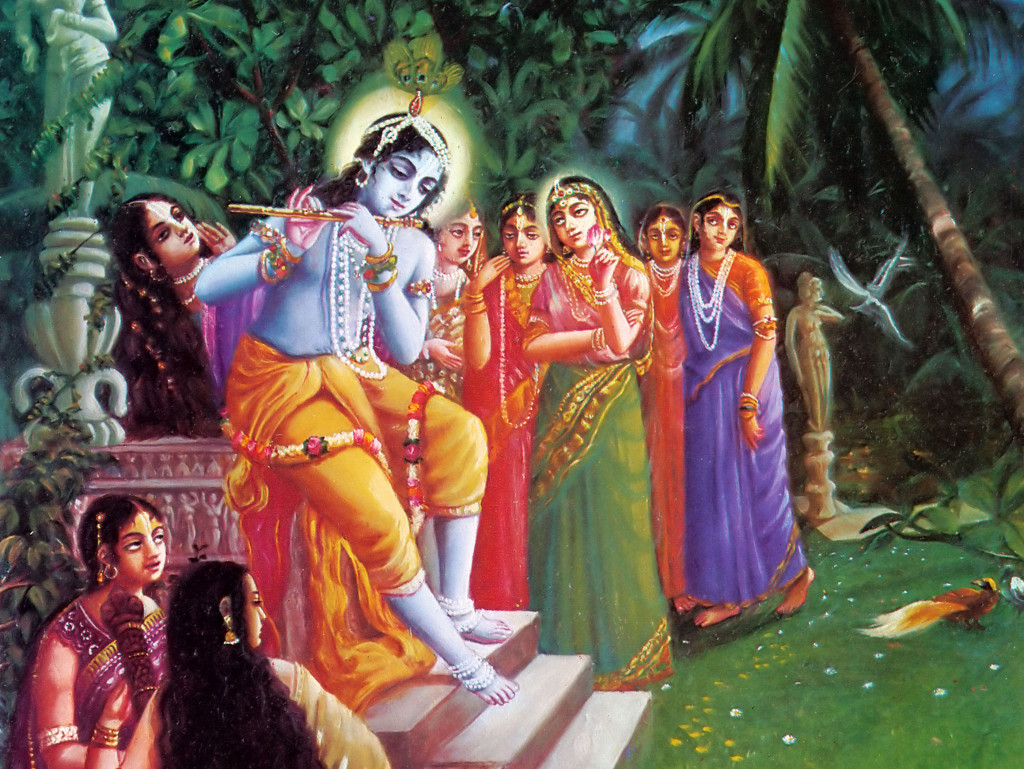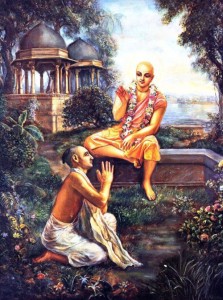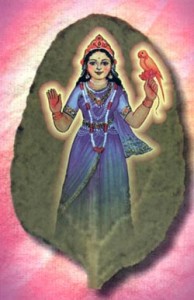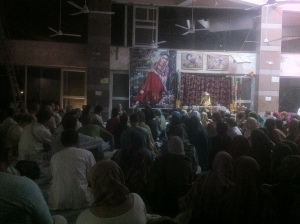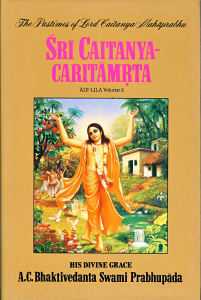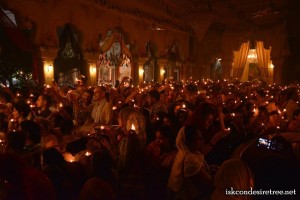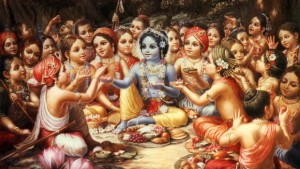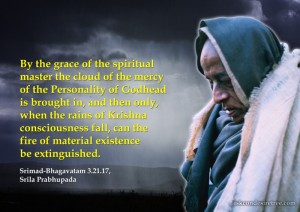Hare Krishna
27th Feb, 2015. Gurgaon
This is the second last blog in the series of last few blogs on Vaishanava etiquette and Vaishanava Apradha. We will read about three categories of devotees and what Srila Bhaktivinoda Thakura has to say on Vaishnava Apradha.
Srila Bhaktivinoda Thakura writes in `Vaisnava Ninda’ (Sajjan Toshani, 1893) that If we neglect to show respect to the ordinary jivas, special honour to the religious jiva, and proper respect to brahmana-jivas and vaisnava-praya-jivas, then we invite sin upon ourselves. But to show disrespect or dishonour to a vaisnava-jiva is an aparadha. Performing ordinary penances can erase so many sins, but an aparadha is not dispelled so easily. Sins influence the gross and subtle bodies. Aparadha specifically affects the jiva’s very soul and causes him to fall down. Thus, whoever wishes to perform bhajana of the Lord must guard against committing aparadha.
Three kinds of Vaishnavas
In NoI verse 5 Rupa Goswami writes :
kṛṣṇeti yasya giri taṁ manasādriyeta dīkṣāsti cet praṇatibhiś ca bhajantam īśam
śuśrūṣayā bhajana-vijñam ananyam anya-nindādi-śūnya-hṛdam īpsita-saṅga-labdhyā
One should mentally honor the devotee who chants the holy name of Lord Kṛṣṇa, one should offer humble obeisances to the devotee who has undergone spiritual initiation [dīkṣā] and is engaged in worshiping the Deity, and one should associate with and faithfully serve that pure devotee who is advanced in undeviated devotional service and whose heart is completely devoid of the propensity to criticize others.
Prabhupada writes in his purport that
The kaniṣṭha-adhikārī is a neophyte who has received the hari-nāma initiation from the spiritual master and is trying to chant the holy name of Kṛṣṇa. One should respect such a person within his mind as a kaniṣṭha Vaiṣṇava.
A madhyama-adhikārī has received spiritual initiation from the spiritual master and has been fully engaged by him in the transcendental loving service of the Lord. The madhyama-adhikārī should be considered to be situated midway in devotional service.
The uttama-adhikārī, or highest devotee, is one who is very advanced in devotional service. An uttama-adhikārī is not interested in blaspheming others, his heart is completely clean, and he has attained the realized state of unalloyed Kṛṣṇa consciousness.
What does Srimad Bhagvatam says (Srila Prabhupada also quotes the same in his above purport of NoI verse 5) :
A devotee who faithfully engages in the worship of the Deity in the temple but does not behave properly toward other devotees or people in general is called a prākṛta-bhakta, a materialistic devotee, and is considered to be in the lowest position. (SB 11.2.47)
An intermediate or second-class devotee, called madhyama-adhikārī, offers his love to the Supreme Personality of Godhead, is a sincere friend to all the devotees of the Lord, shows mercy to ignorant people who are innocent and disregards those who are envious of the Supreme Personality of Godhead. (SB 11.2.46)
The most advanced devotee sees within everything the soul of all souls, the Supreme Personality of Godhead, Śrī Kṛṣṇa. Consequently he sees everything in relation to the Supreme Lord and understands that everything that exists is eternally situated within the Lord. (SB 11.2.45)
What does Mahāprabhu says :
Śrī Caitanya Mahāprabhu then finally advised, “One who is chanting the Hare Kṛṣṇa mantra is understood to be a Vaiṣṇava; therefore you should offer all respects to him.” cc madhya 15.111
“A person who is always chanting the holy name of the Lord is to be considered a first-class Vaiṣṇava, and your duty is to serve his lotus feet.” cc madhya 16.72
The following year, the inhabitants of Kulīna-grāma again asked the Lord the same question. Hearing this question, Śrī Caitanya Mahāprabhu again taught them about the different types of Vaiṣṇavas.
Śrī Caitanya Mahāprabhu said, “A first-class Vaiṣṇava is he whose very presence makes others chant the holy name of Kṛṣṇa.” cc madhya 16.74
krama kari’ kahe prabhu ‘vaiṣṇava’-lakṣaṇa
‘vaiṣṇava’, ‘vaiṣṇavatara’, āra ‘vaiṣṇavatama’
Translation:
In this way, Śrī Caitanya Mahāprabhu taught the distinctions between different types of Vaiṣṇavas — the Vaiṣṇava, Vaiṣṇavatara and Vaiṣṇavatama. He thus successively explained all the symptoms of a Vaiṣṇava to the inhabitants of Kulīna-grāma.
So according to the above instructions of Mahaprabhu, simply by chanting Hare Krishna mantra, one attains the platform of a Vaisnava !
Śrī Caitanya Mahāprabhu replied, “Whoever chants the holy name of Kṛṣṇa just once is worshipable and is the topmost human being. ( CC Madhya 15.106)
Śrī Caitanya Mahāprabhu then finally advised, “One who is chanting the Hare Kṛṣṇa mantra is understood to be a Vaiṣṇava; therefore you should offer all respects to him.” (CC Madhya 15.111)
Srila Prabhupada writes in his purport to above verse that :
A properly initiated Vaiṣṇava may be imperfect, but one who chants the holy name of the Lord offenselessly is all-perfect. Although he may apparently be a neophyte, he still has to be considered a pure, unalloyed Vaiṣṇava. It is the duty of the householder to offer respects to such an unalloyed Vaiṣṇava. This is Śrī Caitanya Mahāprabhu’s instruction
Srila Bhaktivinoda Thakura adds
O readers! Any faults that were previously in a Vaisnava before bhakti appeared within him should never be considered, unless there is some noble intention in doing so. A Vaisnava should never be criticized for the insignificant residue of his previous faults, which is why Sri Krsna has explained the following in Bhagavad-Gita:
Even if one commits the most abominable action, if he is engaged in devotional service he is to be considered saintly because he is properly situated in his determination. He quickly becomes righteous and attains lasting peace. O son of Kuntī, declare it boldly that My devotee never perishes. (BG 9.30-31)
Through the influence of bhakti, all abominable activities that may have existed before the appearance of bhakti, which seemed to be one’s very own nature, are reduced day by day and are finally destroyed within a short time. Discussing the faults of a Vaisnava without a virtuous intention results in vaisnava-aparadha. If one sees some fault in a Vaisnava that appears due to divine providence, one should still not blaspheme that Vaisnava. In this regard, Karabhajana has said
One who has thus given up all other engagements and has taken full shelter at the lotus feet of Hari, the Supreme Personality of Godhead, is very dear to the Lord. Indeed, if such a surrendered soul accidentally commits some sinful activity, the Supreme Personality of Godhead, who is seated within everyone’s heart, immediately takes away the reaction to such sin. (SB 11.5.42)
Srila Bhaktivinod Thakura further emphaises in the end that :
Apart from well-intended discussions of those faults that may arise accidentally, one is liable to commit the offense of criticising a Vaisnava. The fundamental point here is that slandering and blaspheming a Vaisnava..leads to namaparadha, and if one commits namaparadha, then divine revelation (sphurti) of the Holy Name will never manifest. One cannot become a Vaisnava without such revelation of the Holy Name.
O readers! You must think carefully upon this serious subject matter. According to proper devotional conclusions, you must show honor to true Vaisnavas and without any hesitation whatsoever, abandon the company of non-devotees. If one blasphemes a genuine Vaisnava, then the transcendental truth concerning the Holy Name (nama-tattva) will never manifest within one’s heart.
So this is the punishment we receive if we blaspheme other devotees, the Holy Name withdraws the taste from us!
We can clearly see from the above that anyone who chants Krishna’s name is to be considered a vaisnava and he/she is worshipable. We also understood what are the serious consequences of criticism of a devotee on our bhajan and spiritual journey.
Please pardon any errors in the blog as I do not have too much realisations on this deep topic but I still felt inspired to share the same with devotees.
In the next blog, the final one in this series, we will find out what is the cause of Vaishnava Apradha? And how to avoid it!
All glories to Srila Bhaktivinoda Thakura.
All glories to Sri Guru and Gauranga.
All glories to Srila Prabhupada.

